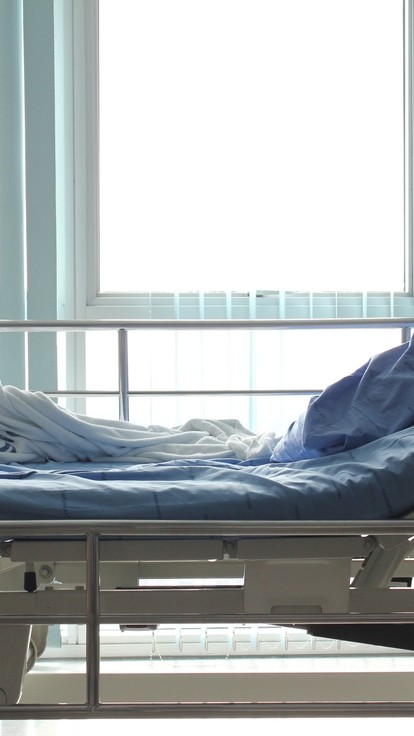Case comment: Hospital obtains urgent interim injunction requiring patient to vacate hospital bed

Details
University College London Hospitals NHS Foundation Trust -v- MB [2020] EWHC 882 (QB)
Chamberlain J has handed down an important and timely judgment in the High Court case of University College London Hospitals NHS Foundation Trust -v- MB [2020] EWHC 882, involving a patient who refused to leave the ward of a hospital to a package of care in the community.
The claimant hospital issued a claim on 2 April 2020 seeking possession of the bedroom from the defendant patient, MB, who was on an acute neuropsychiatry ward.
The application was shortly thereafter reconstituted as a claim for an injunction following the judge drawing the parties’ attention to CPR 51Z PD, which stays possession claims under CPR Pt 55 for a period of 90 days.
Background
MB was first admitted to the hospital on 18 February 2019 after collapsing at home. She has a diagnosis of functional neurological disorder manifesting as variable physical and mental health symptoms.
Discussions relating to MB’s care package were ongoing for more than a year before the application was issued. A property was ready for MB on 16 March 2020 and a care package was offered by Camden London Borough Council (Camden) which involved 24-hour care, seven days a week for a month, followed by an assessment to review MB’s ongoing needs.
MB however insisted that she would not leave the hospital until she received a guarantee of 24-hour care for at least a year before review. Her representatives also raised a number of concerns MB had about the care package and accommodation.
The hospital’s claim for possession was considered urgent because the COVID-19 pandemic meant that the bedroom was needed urgently for other patients and because in any event it was contrary to MB’s interests to remain in the hospital, where she was at increased risk of contracting COVID-19.
Hospital’s position
The evidence from the hospital addressed each of MB’s concerns and explained that it was satisfied that discharge was appropriate and the package of care was reasonable, notwithstanding the concerns raised by MB, and that it was unlikely that MB would ever be fully reassured as she does not trust hospital authorities, council and possibly other public authority figures.
The hospital noted that it was crucial that MB had ongoing support for her mental health issues but that the risks of her remaining in hospital certainly outweighed any risks of her moving to her flat earlier than MB had originally anticipated.
MB’s position
MB’s position was that she wished to leave hospital but only once her concerns about the care package and the accommodation to which she was to be discharged had been addressed.
It was submitted on MB’s behalf that unless these concerns were addressed to MB’s satisfaction she would as a result of her mental health conditions, which are disabilities, suffer extreme distress and which may lead to self harm or suicide.
It was contended that the decision to require MB to leave hospital involved a breach of her rights under Article 3, Article 8 and Article 14 of the ECHR as well as being contrary to s29 of the Equality Act 2010.
The judgment
Chamberlain J accepted that MB’s behaviours were caused or connected with her mental health difficulties which are disabilities within the meaning of the 2020 Act and for the purposes of Article 14 of the ECHR.
Private law right
- The hospital brought the claim to enforce its private law right as a property owner as it had terminated MB’s licence to occupy that room and legally MB’s status was one of a trespasser
- The hospital would ordinarily be entitled to seek an order for possession pursuant to CPR Part 55 however this was not possible because of the stay on possession claims
- This does not effect claims for injunctions and a property owner is in general entitled to an injunction to enforce its rights as against a trespasser
- The relief should not be granted unless the court is satisfied that there is clearly no defence to the action (Sir David Bean et al, Injunctions (13th ed, 2013)
Public law defence/human rights
The judge concluded that MB had no sustainable public law defence to this claim.
- Article 3 ECHR:
- It is a tragic feature of MB’s complex constellation of mental health difficulties that she frequently suffers from extreme distress whether she is in hospital or not
- If the hospital were precluded from doing anything which might precipitate such distress, it would end up in a situation where it was legally precluded from taking any step other than in accordance with MB’s wishes
- In some circumstances a hospital may have to decide which of two patients, A or B, had a better claim to a bed, even if ceasing to provide inpatient care to one of them to leave will certainly cause extreme distress or risks to the patient’s life
- A hospital, which determines, rationally, and in accordance with lawful policy, that A’s clinical need is greater than B’s, or that A would derive greater clinical benefit from the bed than B, is not precluded by Article 3 from declining to offer inpatient care to B
- The absence of evidence identifying a specific patient or patients who will be disadvantaged if MB remains where she is does mean such patients do not exist
- In any event, the evidence was that the severity of MB’s suffering will not reach the level to engage Article 3. The discharge will no doubt be distressing for MB but the risk of a suicide attempt or self harm is moderate to low. She will have 24 hour care and any deterioration in her mental health will be picked up
- Article 8 ECHR:
- The decision plainly interferes with MB’s right to respect for private and family life, however, the evidence of the hospital amply demonstrates that the interference is justified in order to protect the rights of others
- Article 14 ECHR:
- The decision to decline inpatient care to MB does not discriminate against her on the ground of her disabilities. The hospital treated her in the same way as a patient with different disabilities or with none; it has determined whether to continue to offer her inpatient care on the basis of her clinical need for such care
- Equality Act 2010:
- These arguments are without merit
- Any such discrimination under s29 is justified for the same reasons as given in relation to Article 14. In relation to reasonable adjustments, the history demonstrates that the hospital made every possible reasonable adjustment
Judicial review?
- Any suggestion (it was not argued) to the effect that the hospital’s decision to cease to provide inpatient care for MB and accordingly to require her to leave was irrational in the Wednesbury sense would be unsustainable. The hospital had done everything in their power to secure MB’s discharge to a placement which addresses her concerns.
- The judge also made it clear that if MB had filed a claim for judicial review challenging the decision to cease to provide inpatient care to MB he would have refused permission and certified the claim as totally without merit
Order
The judge granted the following order:
- MB must leave the ward by [a particular time], provided that by that time the hospital has made arrangements to facilitate the transfer of MB (by ambulance trolley and ambulance) and her belongings from the ward to the accommodation to which she is to be discharged
- if such arrangements are made, MB must not obstruct or impede their implementation
- MB may thereafter not re-enter the hospital’s premises without the prior written permission of the claimant, save if admitted by ambulance
Comment
This case provides useful commentary on the allocation of scarce resources at a time in which this is at its most pressing during the COVID-19 pandemic.
However, whilst every case is of course fact specific, the judgment also offers practitioners and healthcare professionals alike, useful guidance on the following issues:
- How to legally enforce the COVID-19 hospital discharge requirements and the procedural elements and requirements to resolve these matters
- What human rights arguments are anticipated and how they are applied
- How the decisions of hospitals to require patients to leave hospital who are medically optimised and who do not require in patient care but who are challenging their care packages will be approached and scrutinised by the court
- What type of evidence is required by other hospitals in mounting such a claim in the future should it be necessary
For further updates and other articles discussing the impact of the coronavirus please view our coronavirus hub.






